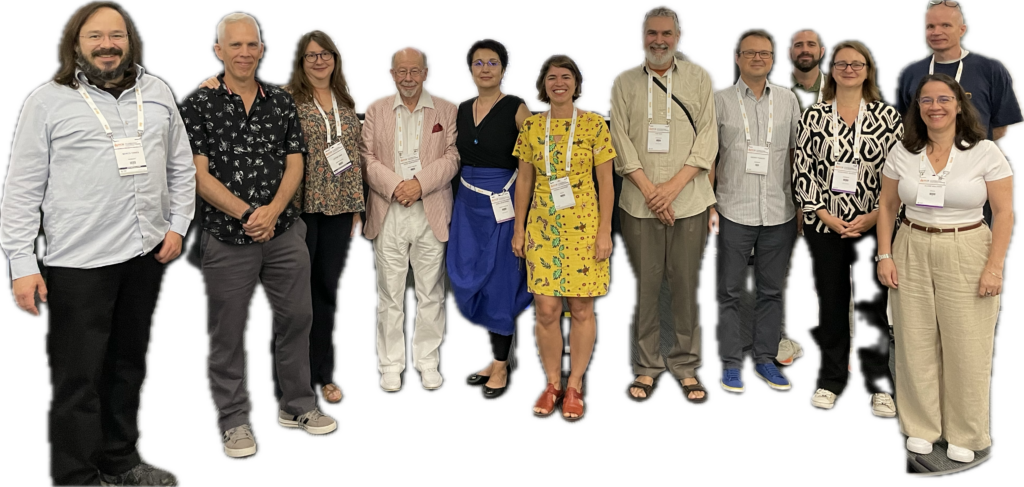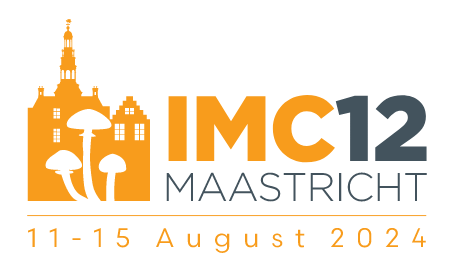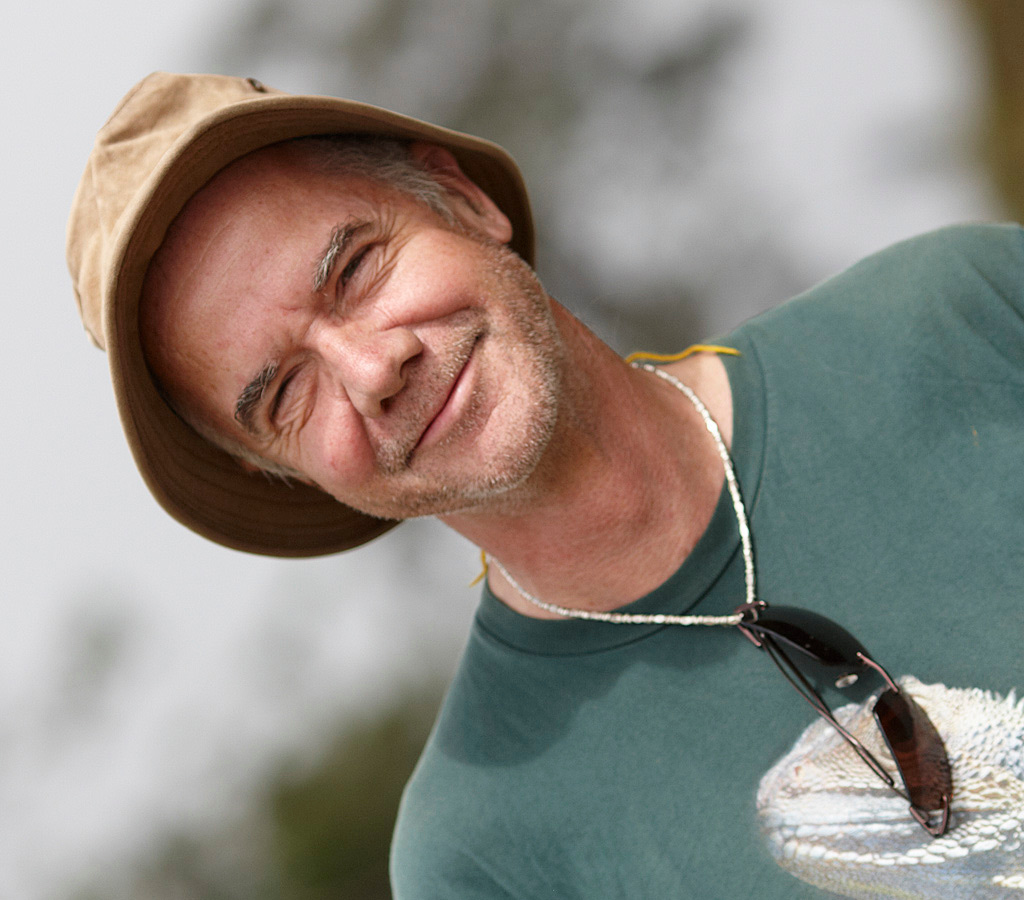1. Definition. The International Commission on the Taxonomy of Fungi (ICTF) is a joint Commission of the Division of Mycology and Eukaryotic Microbiology of the International Union of Microbiological Societies (IUMS), the International Union of Biological Sciences (IUBS), and the International Mycological Association (IMA; Section for General Mycology, IUBS).
2. Objective and Aims. The objective of the ICTF is to promote research on the taxonomy of fungi and fungus-like organisms governed by the International Code of Nomenclature for algae, fungi, and plants, and to develop good taxonomic practice. The Commission’s primary aim is to improve any or all aspects of fungal systematics, and to promote such improvements. The Commission further aims to extend understanding of fungal systematics in the scientific community, by publishing its findings and by sponsoring meetings, workshops and sessions dealing with aspects of its work.
3. Membership. Membership shall be limited to experts in some area of fungal taxonomy, or such other persons who in the opinion of the Commission are able to provide fundamental information on fungal systematics on an ongoing basis. There is a limit of 20 members at any given time. The Commission strives to achieve diversity in terms of gender and geographical representation of its members. The members are entitled to serve a period of 4 (four) years with the possibility of serving more than one term. Prior to each IMC, an anonymous poll shall be undertaken among the current ICTF members to determine the members serving for the upcoming term. Each person voting is allowed to indicate five persons from among the candidates. There will be two rounds of voting. In the first vote, up to 12 members from the previous membership who indicated their willingness to serve again can be re-elected. In the second vote, up to 8 new members will be elected from a list of up to 16 nominees provided by the Board. If less than 12 previous members are re-elected in the first vote, the number of new member positions and nominees in the second vote may be increased accordingly, by the Executive (Rule 7) on the advice of the Board, to make up a maximum membership of 20. In cases of ties, an additional vote will be held to decide among the tied nominees from the respective category in which the tie occurred. If the tie cannot be resolved after this additional vote, the Executive will make the final decision regarding which of the nominees obtaining an equal amount of votes is elected to the ICTF.
4. Ex-officio membership. The business of the Commission often overlaps with the business of other Commissions, Subcommissions, Committees and Working Groups, whose Chairpersons, after consultation, may be designated as ex-officio members of the ICTF by the ICTF Executive. Ex-officio members have the same responsibilities as regular members, but to avoid potential conflicts of interest between the interests of their Commissions and the ICTF, do not have voting privileges. Ex-officio memberships will be re-evaluated at each International Mycological Congress (IMC) in consultation with the relevant Chairpersons. A member of the Nomenclature Committee for Fungi (NCF), to be selected by the Executive in consultation with the NCF Chairperson, will be invited as ex-officio member if current ICTF membership does not include a current member of the NCF.
5. Board of Advisors. The ICTF Board of Advisors (the “Board” elsewhere in these Statutes) consists of previous members of the ICTF who are willing to serve on the Board. At the time the ICTF membership is refreshed (i.e. after the conclusion of a regular term of four years) the Executive shall request members who are stepping down to indicate willingness to serve on the Board. The newly added Board members are ratified by the existing Board and the Executive. A member whose membership was terminated by a majority rule as outlined in Rule 6 is not eligible to join the Board. Members of the Board are entitled to serve a period of 4 (four) years with the possibility of serving more than one term. They will receive regular reports from the President and suggest agenda items without voting on ICTF business. They can also provide general advice by initiating or participating in ICTF Working Groups and Subcomissions and provide a list of nominees to be voted on by the ICTF membership as new members according to the procedures in Rule 3.
6. Termination of membership. A member of the ICTF or the ICTF Board of Advisors may resign at any time by written communication to the Executive Vice-President. Any individual member of the ICTF or the ICTF Board may be terminated at any time by a simple majority vote of members. These votes can be triggered either due to misconduct, loss of trust, or to exclude members not actively participating in the Commission’s work as defined by failing to respond to three consecutive requests for contributions. Vacancies created by termination may be filled by co-option of a new member suggested by the Board and approved by a poll of the existing membership.
7. Executive. The Executive shall consist of a President, a Vice-President, and an Executive Vice-President, and, if the need arises, a Treasurer, elected from within the membership. The President will automatically become the Past-Chair following his/her resignation as the President. The Vice-President shall assume duties as President following the resignation of the previous President. Executive positions are held for four years, with the possibility of being extended with a majority vote, or until such time as elections are called for, at the request of any member in writing to the Executive Vice-President. Appointments will generally end and begin at the International Mycological Congress.
8. Responsibilities. The President shall be responsible for the Commission’s work program. The Vice-President participates in the development and monitoring of the Commission’s work program, with the aim of assuming the duties of setting the work program if he/she assumes the presidency. The Executive Vice-President shall be responsible for keeping minutes of formal meetings, for other record keeping, and for keeping the International Mycological Association, the IUMS Division of Mycology and Eukaryotic Microbiology, and the International Union of Biological Sciences (IUBS) informed of the Commission’s activities. The Treasurer shall be responsible for the Commission’s finances, and shall submit a balance sheet to each formal meeting of the Commission.
9. Governance. The Commission shall be bound by the Statutes of the IUMS Division of Mycology and Eukaryotic Microbiology, as well as those of the IMA.
10. Finances. The Commission has the right to raise funds and to administer those funds as it sees fit, for its own purposes, as a non-profit organization bound by the Statutes of IUMS and IMA.
11. Publications. The Commission has the right to publish any or all of its deliberations, studies or findings, as it sees fit. Members or consultants may publish results of work sponsored by the Commission only with Commission approval, by majority vote, and shall suitably acknowledge Commission support.
12. Subcommissions and Working Groups. The Commission has the right to form, and should actively encourage the formation of Subcommissions and Working Groups. The Subcommissions have the function to promote the systematics of a specific genus, of a related group of genera or other taxonomy-oriented subjects. Such Subcommissions shall be bound by these Statutes and by Statutes of IUMS and IMA. Such Subcommissions shall produce and operate within their own set of Statutes. In other respects such Subcommissions shall be self-governing. The Working Groups should be short term bodies, formed by voting and participation of the ICTF members. Working Groups may add non ICTF members by co-option. Working Groups and Subcommissions should be disbanded after they accomplish their stated goals or become inactive. Joint ICTF-NCF Working Groups under Articles F.2.1 and F.7.1 of the International Code of Nomenclature for algae, fungi, and plants are to be established by consultation between the ICTF and the NCF.
13. Formal meetings. A formal meeting of the Commission is defined as a meeting in which the President or Vice-President is present, minutes are taken, and voting procedures used. A formal meeting may be held at any time when not less than 5 (five) members are together, provided that all Commission members are advised 14 days in advance in writing of such a meeting.
14. Voting. Voting on any matter related to the Commission may be taken by email or other electronic means, in which case a decision will be made by a simple majority of members who return a vote to the Executive Vice-President by a nominated date; or at a formal meeting, as defined in Clause 13, again by a simple majority vote of members present in person or electronically. In these statutes, “voting” is governed by the provisions of this rule.
15. Disbanding. The Commission may be disbanded (1) by simple majority vote of members either by post or at a formal meeting; or (2) by a constitutional and valid vote of IUMS Division of Mycology and Eukaryotic Microbiology and IMA to order disbanding. In the event of disbanding, any and all assets of the Commission shall be disbursed equally between IUMS and IMA.
16. Alteration of Statutes. These Statutes may be altered by simple majority vote of members, under the conditions defined in Rule 14..
These Statutes approved on 15-August-2024, Maastricht


